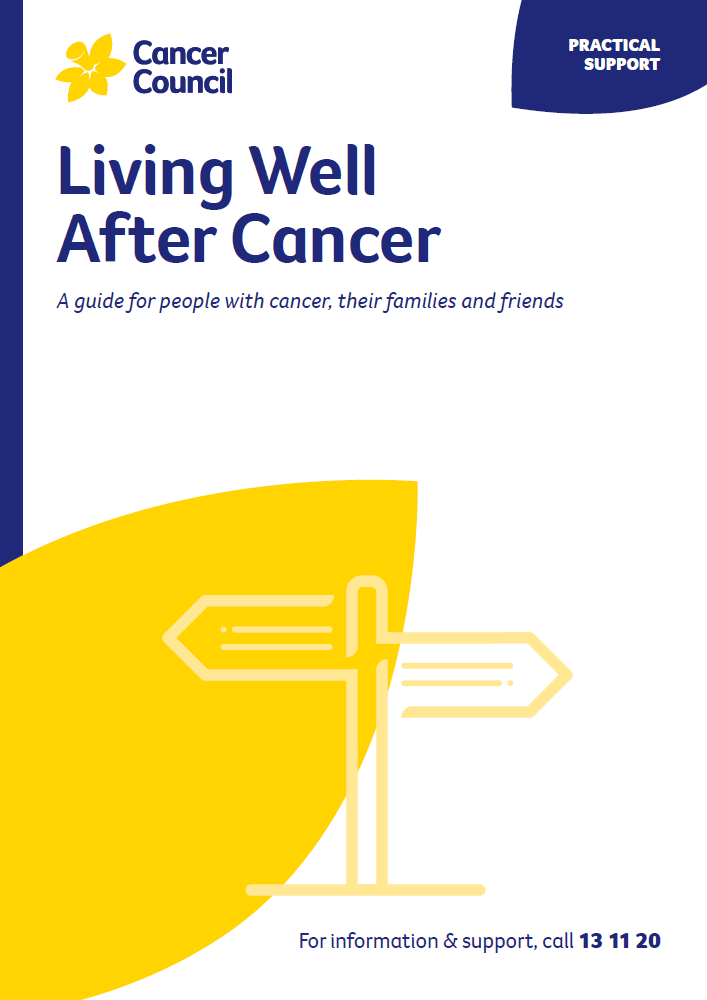- Home
- About Cancer
- Living well
- Living well after cancer
- Seeking support
Seeking support
Many people find they need support after treatment finishes. What services are available may vary depending on where you live. Some services will be free, but others might have a cost.
Learn more about:
Survivorship programs
Survivorship programs provide information about recovery from cancer and its treatment, as well as practical information about life after cancer. Many offer group education programs for survivors that can help you meet others in a similar situation.
You may find it helpful to share tips and ideas with other participants. Some survivorship programs are open to carers, family, friends and work colleagues.
Cancer Council
Your local Cancer Council may offer programs providing information about living well after cancer.
Topics covered may include nutrition, exercises to help improve quality of life, mindfulness and adjusting to life following cancer treatment. You may also find it helpful to watch Cancer Council’s survivorship webinars. Call 13 11 20 to find out what services are available in your area.
Treatment centres
Some hospitals, treatment centres and community organisations offer free education programs for cancer survivors. Ask your oncologist, social worker or cancer nurse for a referral to a local support group or survivorship program.
Really enjoyed the program. I feel after treatment there is a gap in support for getting back to normal life, I liked that it wasn’t ‘you have to make major changes’ because you don’t stick to it, small changes over time.
Ashley
Talk to someone who’s been there
Getting in touch with other people who have had similar experiences to you can be helpful. In a support group, you may find that you are comfortable talking about your issues after treatment, relationships with friends and family, and hopes and fears for the future.
There are many ways to connect with other people in a similar situation. Cancer Council runs face to face and telephone support groups, or can put you in touch with someone who has had a similar cancer experience. You could also join our online discussion forum at Cancer Council’s Online Community.
After treatment, some people want to help improve the cancer experience for others through support groups, volunteer work, advocacy or fundraising. If this interests you, call Cancer Council 13 11 20 for more information. There is no hurry. Focus first on your recovery. It is important to look after yourself if you want to help others.
I’ve just passed the five-year mark and had my final appointment with my oncologist – this has been a big relief. In the last year I’ve become involved as a volunteer providing telephone peer support with Cancer Connect.
Christine
→ WATCH: Videos about living well after cancer
More resources
Prof Michael Jefford, Medical Oncologist and Director, Australian Cancer Survivorship Centre, Peter MacCallum Cancer Centre, VIC (clinical review); Lucy Bailey, Nurse Counsellor, Cancer Council Queensland; Philip Bullas, Consumer; Dr Kate Gunn, Clinical Psychologist and Senior Research Fellow, Department of Rural Health, University of South Australia, SA; Rosemerry Hodgkin, 13 11 20 Consultant, Cancer Council WA; Prof David Joske, Clinical Haematologist, Sir Charles Gairdner Hospital and Clinical Professor of Medicine, The University of Western Australia, WA; Kim Kerin-Ayres, Clinical Nurse Consultant, Cancer Survivorship, Concord Hospital, NSW; Sally Littlewood, Physiotherapist, Seymour Health, VIC; Georgina Lohse, Social Worker, GV Health, VIC; Melanie Moore, Exercise Physiologist and Clinical Supervisor, University of Canberra Cancer Wellness Clinic, ACT; June Savva, Senior Clinician Dietitian, Nutrition and Dietetics, Monash Cancer Centre, Monash Health, VIC; Dr Elysia Thornton-Benko, Specialist General Practitioner and Research Fellow, University of New South Wales, NSW; Prof Janette Vardy, Medical Oncologist, Concord Cancer Centre and Professor of Cancer Medicine, The University of Sydney, NSW; Lyndell Wills, Consumer.
View the Cancer Council NSW editorial policy.
View all publications or call 13 11 20 for free printed copies.

